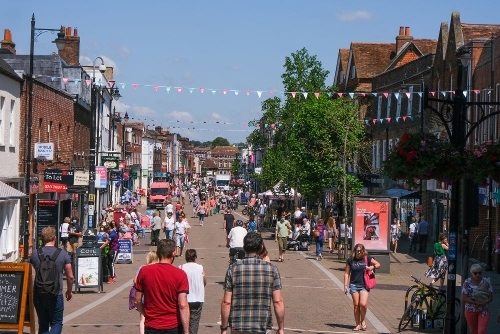Renewed commitment to pedestrianisation in Newbury
A trial extension to the pedestrianisation timings in Newbury town centre

West Berkshire Council is poised to revisit the pedestrianisation of Newbury town centre with a new application to the Department for Transport (DfT) later this month.
The Council will be applying for an Experimental Traffic Regulation Order (ETRO) following discussions with the DfT in recent months.
The proposal was initially put forward in the summer but faced a temporary delay due to essential road works and ongoing discussions with the DfT to confirm the process for implementing the ETRO. With an ETRO, the trial and the consultation run in parallel, meaning feedback is based on real experience of the changes.
If we are unsuccessful in obtaining an ETRO, which is our preferred option, we will move forward with a standard Traffic Regulation Order (TRO) which will require a specific consultation in advance and thus take longer to implement.
The proposed trial seeks to extend the pedestrianised zone's timings, stretching from 10am to 11pm, and would affect Northbrook Street, Bridge Street, Bartholomew Street (north), Mansion House Street, and Market Place.
The trial, which will be in place for a minimum of six months, will not only assess the impact on the town but also engage with residents, businesses, and stakeholders for their views on the changes through a consultation.
Our primary aim is to determine whether pedestrianisation can make the town centre more attractive to shoppers, workers, and visitors by boosting the day and night-time economy to create the café culture ambience and alfresco evening dining, increase the number of evening events, reduce traffic movement, and reduce air pollution in the town centre whilst giving priority to pedestrians and cyclists where appropriate.
The trial also supports our aspirations outlined in the Newbury Town Centre Masterplan, which was shaped by 4,000 survey responses from residents and businesses and endorsed by the Executive earlier this year. It also meets several of our priorities in our Council Strategy 2023-2027 including encouraging active travel options.
Speaking about revisiting the proposal, Councillor Denise Gaines, Executive Member for Highways, Housing and Sustainable Travel, said:
"Making the town centre vehicle free for a longer period would be beneficial to the vibrancy and feel of the town with more 'spill-out' space for cafés and restaurants and flexibility for larger events and markets, responding to new social and shopping trends.
"We are in the process of writing to the Secretary of State and optimistic that, subject to the DfT successfully agreeing the ETRO, the trial could begin as early as May 2024 - just in time for us all to enjoy the better weather!
"Importantly, this trial is not just about change; it's about experiencing a reimagined Newbury town centre. Residents and businesses are invited to try out the new arrangements first for a few months before providing invaluable feedback for a trial that could reshape the heart of our community."
You can keep up to date on how we are re-shaping town centres and high streets across West Berkshire on our town centres pages of our website.
What is an Experimental Traffic Regulation Order?
Traffic Regulation Orders are legal documents which restrict the use of the public highway in many ways, either permanently, experimentally or temporarily.
An Experimental Traffic Regulation Order can be in place for place for up to 18 months. The first six months should be used for the public to comment on how the scheme is working, or not. The Local Authority then has the following 12 months to review all of the comments, decide how to proceed and make the permanent order if the public support outweighs the objections during the consultation.
The benefit of an ETRO is that it gives the community the opportunity to experience the proposed restrictions rather than asking them to comment on something that is theoretical without the commitment of it necessarily being permanent.
An Experimental Traffic Regulation Order does not end at the end of the six month period but remains in place (for up to another 12 months) while the local authority considers the evidence and feedback from the trial and makes a decision on whether or not it should be made permanent.




